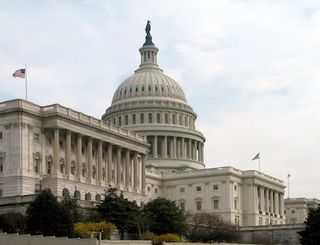Bipartisan Bill Takes Aim at 'Disco-Era' Media Regs

Incoming House Energy & Commerce Committee chair Greg Walden (R-Ore.) and Rep. John Yarmuth (D-Ky) have introduced a bill to repeal the newspaper-broadcast crossownership ban, citing, for one thing, the need to have real news to counter the "fake news" that has been getting so much attention of late.
Those are likely to be rolled back in a Donald TrumpFCC anyway, but the legislators are taking no chances.
The FCC under chairman Tom Wheeler declined to scrap the rule in the recent quadrennial ownership review, despite suggestions on both sides of the political spectrum that it had outlived its usefulness.
Related: House Passes Veterans Broadband Access Bill
The rule dates from 1975 and prevents TV and radio stations from owning a daily newspaper in the same market. The FCC in 2003 under then-chairman Michael Powell, found the rule no longer in the public interest, but that decision was challenged in court and was not the conclusion of the Democratic majority under Wheeler.
"This bipartisan effort finally acknowledges that our current media landscape is far different than it was nearly 50 years ago,” said Rep. Yarmuth in a statement. “As we’ve seen the rise in fake news and its consequences, it is increasingly important that we do all we can to protect legitimate sources of news. This legislation would give media entities the flexibility they need to compete and grow in this challenging marketplace.”
Related: The Word Network Aims FCC, FTC Complaints at Comcast
Broadcasting & Cable Newsletter
The smarter way to stay on top of broadcasting and cable industry. Sign up below
“Times have changed, and it’s critical our media ownership rules keep pace with the innovation era," said Rep. Walden, himself a former broadcaster.
"This bipartisan bill is just the latest in our continued efforts to modernize outdated rules and promote investment in the communications sector,” said Walden. “Eliminating this relic of the disco era will provide much needed flexibility to the many newspapers and broadcasters throughout the country that provide important local news coverage and encourage greater investment in original journalism. We want what’s best for consumers and this bill provides a thoughtful solution that puts the public’s interest first.”
Related: Wireless Companies Won't Bid Up TV Spectrum
"NAB applauds Chairman Walden, Rep. Yarmuth and their bipartisan cosponsors for introducing a bill to eliminate the broadcast-newspaper cross-ownership rule," said NAB president Gordon Smith. "This legislation is an important step towards aligning outdated broadcast ownership rules with Americans’ 21st century information needs. For too long, radio and television broadcasters have been saddled with archaic regulations preventing them from investing in newspaper ownership. Striking this cross-ownership ban would save journalism jobs, create more investigative reporting and provide communities with greater local news.”
“We are pleased to see solid bipartisan support for commonsense legislation that reverses an outdated rule that does more harm than good," said David Chavern, president and CEO of the News Media Alliance, which represents newspapers opposed to the ban. "This Nixon-Administration rule has absurdly prevented investment in newspapers that have print, while digital-only properties have been free to invest (and be invested in) without restrictions. During this time in which readers consume an increasing amount news from countless sources, and over a growing number of devices and platforms, we cannot fathom why the government would prevent collaboration between the two entities — newspapers and broadcasters — that are still investing in credible, local journalism."
Contributing editor John Eggerton has been an editor and/or writer on media regulation, legislation and policy for over four decades, including covering the FCC, FTC, Congress, the major media trade associations, and the federal courts. In addition to Multichannel News and Broadcasting + Cable, his work has appeared in Radio World, TV Technology, TV Fax, This Week in Consumer Electronics, Variety and the Encyclopedia Britannica.

